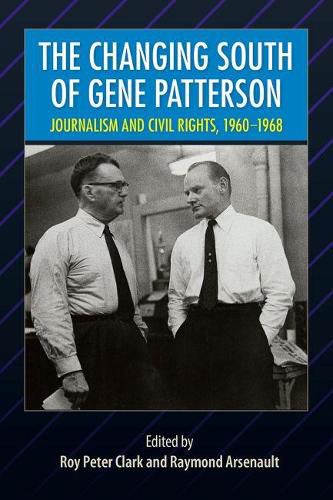Readings Newsletter
Become a Readings Member to make your shopping experience even easier.
Sign in or sign up for free!
You’re not far away from qualifying for FREE standard shipping within Australia
You’ve qualified for FREE standard shipping within Australia
The cart is loading…






This title is printed to order. This book may have been self-published. If so, we cannot guarantee the quality of the content. In the main most books will have gone through the editing process however some may not. We therefore suggest that you be aware of this before ordering this book. If in doubt check either the author or publisher’s details as we are unable to accept any returns unless they are faulty. Please contact us if you have any questions.
The Changing South of Gene Patterson celebrates the work of one of America’s most influential journalists who wrote in a time and place of dramatic social and political upheaval. The editor of the Atlanta Constitution from 1960 through 1968, Patterson wrote directly to his fellow white southerners every day, working to persuade them to change their ways. His words were so inspirational that he was asked by Walter Cronkite to read his most famous column, about the Birmingham church bombing, live on the CBS Evening News.
This volume includes over 120 of Patterson’s best pieces, selected from some 3,200 columns. These columns offer probing commentary on the crucial issues of race, civil rights, social justice, and desegregation; some reveal examples of political and moral leadership, drawn from every corner of southern culture. Introductory essays, framing Patterson’s work as journalism and literature, place it in the context of southern history and the evolution of white southern liberalism. Patterson himself contributes a new essay, reflecting on his life, work, and times.
At a time when protest, violence, and confrontation defined race relations and even the South itself, Patterson’s wise, sane, humorous, passionate column appeared daily on the Constitution’s editorial page, urging white southerners to become better than we are. Speaking as one who grew up hard in small-town Georgia, Patterson could urge change with a conviction and credibility matched by few others. With enlightened leadership and adherence to the rule of law, the sky would not fall, Patterson assured his readers. While black leaders led America toward civil rights and social justice, writers such as Patterson had the courage to appeal to the white southern conscience. Unmistakably engaged with his time and place, Patterson’s columns provide a compelling day-to-day look at the civil rights era as it unfolded.
$9.00 standard shipping within Australia
FREE standard shipping within Australia for orders over $100.00
Express & International shipping calculated at checkout
This title is printed to order. This book may have been self-published. If so, we cannot guarantee the quality of the content. In the main most books will have gone through the editing process however some may not. We therefore suggest that you be aware of this before ordering this book. If in doubt check either the author or publisher’s details as we are unable to accept any returns unless they are faulty. Please contact us if you have any questions.
The Changing South of Gene Patterson celebrates the work of one of America’s most influential journalists who wrote in a time and place of dramatic social and political upheaval. The editor of the Atlanta Constitution from 1960 through 1968, Patterson wrote directly to his fellow white southerners every day, working to persuade them to change their ways. His words were so inspirational that he was asked by Walter Cronkite to read his most famous column, about the Birmingham church bombing, live on the CBS Evening News.
This volume includes over 120 of Patterson’s best pieces, selected from some 3,200 columns. These columns offer probing commentary on the crucial issues of race, civil rights, social justice, and desegregation; some reveal examples of political and moral leadership, drawn from every corner of southern culture. Introductory essays, framing Patterson’s work as journalism and literature, place it in the context of southern history and the evolution of white southern liberalism. Patterson himself contributes a new essay, reflecting on his life, work, and times.
At a time when protest, violence, and confrontation defined race relations and even the South itself, Patterson’s wise, sane, humorous, passionate column appeared daily on the Constitution’s editorial page, urging white southerners to become better than we are. Speaking as one who grew up hard in small-town Georgia, Patterson could urge change with a conviction and credibility matched by few others. With enlightened leadership and adherence to the rule of law, the sky would not fall, Patterson assured his readers. While black leaders led America toward civil rights and social justice, writers such as Patterson had the courage to appeal to the white southern conscience. Unmistakably engaged with his time and place, Patterson’s columns provide a compelling day-to-day look at the civil rights era as it unfolded.